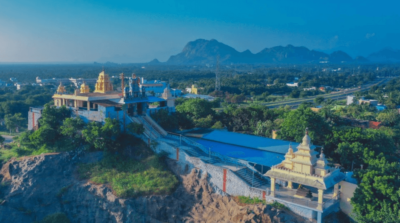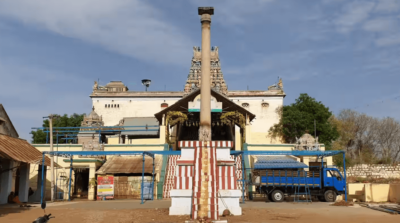Sri Vetri Velappar Temple
The Sri Vetri Velappar Temple in Kodaikanal, Tamil Nadu, is an ancient and revered temple dedicated to Lord Murugan, also known as Vetri Velappar, meaning “Lord of the Victorious Spear.” This temple is one of the significant Murugan temples in the Kodaikanal region, attracting devotees who seek the blessings of Lord Murugan for success, protection, and spiritual upliftment.
Vetri Velappar Temple History
Historical Background
- Ancient Origins: The history of the Sri Vetri Velappar Temple is believed to date back several centuries, and it is considered one of the oldest temples dedicated to Lord Murugan in the Kodaikanal area. The temple has a long-standing association with Tamil culture and the worship of Murugan as the deity of hills and mountains.
- Murugan and the Kurinji Land: In Tamil Sangam literature, Murugan is revered as the god of the “Kurinji” landscape, which represents the mountainous and hilly regions. The association of the temple with Kodaikanal’s hill terrain reflects this cultural connection, and the temple is considered a manifestation of Murugan’s presence in the Kurinji land.
The Deity – Vetri Velappar
- Lord Murugan as Vetri Velappar: In the Sri Vetri Velappar Temple, Murugan is worshipped as Vetri Velappar, the “Lord of Victory.” The deity carries the Vel, a divine spear given to him by his mother, Goddess Parvati, symbolizing his role as the protector of devotees and the vanquisher of evil.
- Devotees’ Belief: Worshippers believe that Lord Vetri Velappar grants success in endeavors, courage to overcome obstacles, and relief from ailments. Many devotees visit the temple to seek blessings for academic success, business ventures, and personal challenges.
Festivals and Rituals
- Thaipusam: The temple is a focal point for the celebration of Thaipusam, which occurs in the Tamil month of Thai (January-February). This festival marks the event when Murugan received the Vel from Goddess Parvati to defeat the demon Surapadman. Devotees perform special rituals, including carrying Kavadis, as an act of devotion and penance.
- Panguni Uthiram: Celebrated during the Tamil month of Panguni (March-April), this festival is associated with the celestial wedding of Lord Murugan and Deivanai. The temple witnesses special poojas, processions, and festivities during this period.
- Skanda Sashti: A significant festival in Murugan worship, Skanda Sashti is observed with fervor at the Sri Vetri Velappar Temple. It commemorates Murugan’s victory over the demon Surapadman and is marked by six days of fasting, special poojas, and dramatic enactments of the victory.
- Regular Poojas: Daily rituals include abhishekam (sacred bathing of the deity), archanai (flower offerings), and deeparadhana (lighting of lamps), which are performed to invoke the blessings of Lord Murugan.
Architecture
- Traditional South Indian Style: The temple architecture is characteristic of traditional South Indian temple styles, with a sanctum sanctorum where the main deity is enshrined. The structure includes a hall for rituals and devotees to gather.
- Simplicity and Harmony with Nature: The temple’s design emphasizes simplicity, blending with the surrounding natural environment. The location itself adds to the spiritual ambiance, providing a tranquil setting for worship and meditation.
Cultural and Spiritual Significance
- Pilgrimage and Templeventure: The journey to the Sri Vetri Velappar Temple often involves trekking through the Western Ghats, making it not just a spiritual pilgrimage but also an adventurous experience. The trek symbolizes a devotee’s commitment and dedication to reaching Murugan.
- Connection to Tamil Heritage: The temple serves as a cultural hub, preserving the traditional worship practices associated with Lord Murugan. It plays an essential role in keeping the spiritual heritage alive, especially in the hill regions where Murugan is regarded as the guardian deity.
The Sri Vetri Velappar Temple in Kodaikanal, with its rich history, spiritual significance, and picturesque setting, stands as a testament to the deep-rooted worship of Lord Murugan in Tamil culture, offering a place for devotees to experience divine grace amidst the beauty of nature.
Location
- Situated near Kodaikanal: The Sri Vetri Velappar Temple is located in the village of Vellagavi, a traditional Tamil settlement near Kodaikanal, nestled in the Western Ghats. The temple’s setting amidst lush hills and serene natural surroundings makes it a spiritually enriching location.
- Vellagavi Village: The village itself is one of the oldest in the region, known for its unique heritage and deep-rooted cultural traditions. Vellagavi is accessible by trekking from Kodaikanal, providing an adventurous and spiritual journey for pilgrims.




